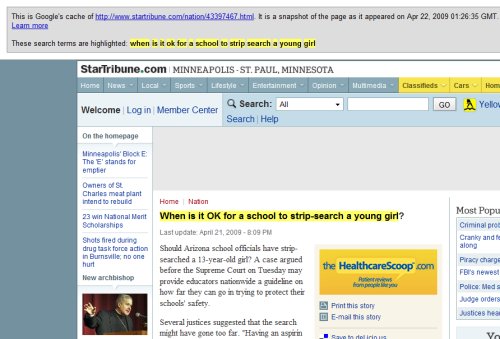From Drug War Chronicle (2008-08-22): Feature: The Drug Checkpoint That Wasn’t — Louisiana Lawmen Play Fast and Loose with the Constitution:
In its 2000 decision in Indianapolis v. Edmond, the US Supreme Court held that the city’s effort to attack the drug trade by holding a checkpoint to look for drugs was an unconstitutional violation of the Fourth Amendment’s protection of the right to be free from unwarranted searches and seizures. But in the years since then, a handful of departments across the county, usually in the South, have brazenly trumpeted their resort to drug checkpoints.
The latest department to step into the breach was Louisiana’s Beauregard Parish Sheriff’s Office, which held such a checkpoint last Thursday night near the town of Starks. Following the lead of sheriff’s deputies, the local newspaper was all over the story.
Narcotics checkpoint a success,
blared the headline in Monday’s Derrider Daily News story on the police action. The article went on to explain how, following complaints of drug dealing in the neighborhood, police decided to take action:
The Beauregard Parish Sheriff’s Office set up a Narcotics Checkpoint Thursday night near Starks, Louisiana,
the local paper reported. Due to several complaints coming from the Fields area, the BPSO put together a joint operation with the help of Sheriff Ricky Moses and the DeRidder city police department. The operations utilized several BPSO deputies as well as the new Drug Interdiction team led by Detectives Dale Sharp and Greg Hill. Seven police units total were used for the operation in addition to four other units performing regular patrols.
The checkpoint resulted in three arrests for marijuana and hydrocodone possession, a quarter pound of marijuana being tossed from an unknown vehicle’s window, and a number of traffic citations.
If this really was a drug checkpoint, it is clearly unconstitutional,
said Steve Silverman, executive director of the constitutional rights defense group Flex Your Rights.
Well, O.K., whatever. If you are ever hauled into court as the result of one of these checkpoints, that’s important information to have. But the problem is that cops are, as a rule, better at manipulating the court than you are; they are trained in how to exploit loopholes, how to manipulate people, and how to get cheap sympathy from judges and juries. As Silverman himself says:
If people went to court and fought it, the evidence would be dismissed — unless they consented to a search. The sheriff down there must know checkpoints like this are constitutionally questionable, but they can still ask people to consent, and they know how to phrase that request in such a way that people are likely to consent,
he said.
The problem with these roadblocks and checkpoints
by uniformed highwaymen, which impose blanket screening of ordinary people by police and which intimidate or force everyone to submit to interrogation and searches, treating anyone who happens to be on a particular road as a presumptive criminal, who needs to prove her innocence to the police in order to be left alone to go about her own business, based on no probable cause whatever — and all in order to find and imprison a handful of nonviolent drug traffickers, who are violating absolutely nobody’s rights, who are doing a peaceful and productive service for willing customers, whose only crime
was to defy a senseless government prohibition on the kinds of chemicals that people may willingly put into their own bodies — the problem with that, I say, has nothing to do with whether these internal checkpoints and constrictions on peaceful people’s freedom of movement and security in their persons and effects, happen to be consistent or inconsistent with a fundamentalist reading of the words scribbled onto a 200-year-old piece of paper. The real problem is not that this kind of Ihre Papiere, bitte
treatment is unconstitutional; it’s that it’s tyrannical. Tyranny is bad enough whether or not the Nine can be convinced that it can be excused on a legal technicality, and the reasons why are moral, not constitutional. Even when cops can invent absurd technicalities in order to convince a judge (who is always willing to be convinced that another State employee was acting within bounds) that their extraction of searches through intimidation, coercion, and the inevitable recourse to the threat of arbitrary arrest on any of the countless vague laws that nobody can possibly avoid violating in daily life, all somehow amounts to consent.
And those of us who oppose the drug war, and the police state that has emerged in order to prosecute it, ought to be more clear and less timid about saying so. We don’t need The Law on our side to be right. If the Constitution allows that kind of brigandry and tyranny, then the Constitution itself is tyrannical. If the Constitution does not allow it, then it has been demonstrated as thoroughly as you please that the Constitution can do nothing effective to prevent it. In either case it is unfit to exist, and certainly undeserving of our deferential appeals.
In related news, holiday bloggers should keep in mind that there are only 7 more ranting days left before International Ignore the Constitution Day.
See also:


